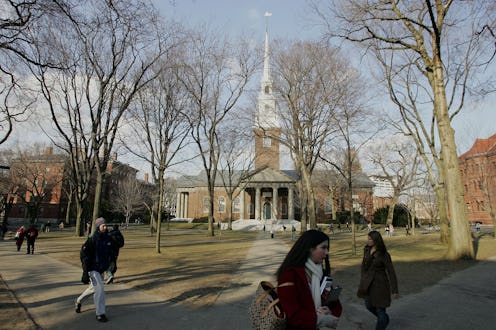Life
Are Tuition Increases Supported?
It's no secret that college tuition in the United States has gotten shockingly expensive, and top tier schools are no exception, as a recent look by Mic at the cost of attendance at the top-ranked universities shows. It seems that despite the hype, attending a top school could be more of a ticket to crushing student loan debt, rather than your key to success, if you aren't careful. And while financial aid is available at just about every school, it doesn't cover everything. Which is why each successive graduating class just winds up with more and more debt.
So, why is cost of attendance going up so much? A big part of it are large hikes in tuition, which needless to say grows much faster than inflation. So, why the tuition increases? Is it that the education is getting that much better? In other words, are you really getting what you pay for at top schools?
Well, in many ways this is an impossible question to answer. How do you give an education a score? How do you compare the education of an undergraduate at one school to that of an undergraduate at another? How do you decide if the education provided by one institution is better than it used to be? It's all so subjective.
Fortunately, however, there are lots of people will to try their hand at ranking universities anyway. Going off the US News and World Report Rankings (flawed though they and every other college ranking may be), I decided to see if tuition increases over the past five years really are justified. For that, I looked at the six top-ranked schools going into the 2015-2016 school year (three of which are tied) and the tuition for this upcoming school year, and compared it to the schools' ranking and tuition from the 2010-2011 school year.
So, what are the schools and how did they do?
1. Princeton
2015
Ranking: #1
Cost of Attendance: $41,820
2010
Ranking: #1 (Tied)
Tuition: $36,640
2. Harvard
2015
Ranking: #2
Tuition: $45,278
2010
Ranking: #1 (Tied)
Tuition: $34,976
3. Yale
2015
Ranking: #3
Tuition: $45,800
2010
Ranking: #3
Tuition: $38,300
4. (Tied) Columbia
2015
Ranking: #4 (Tied)
Tuition: $51,008
2010
Ranking: #8 (Tied)
Tuition: $41,160
4. (Tied) University of Chicago
2015
Ranking: #4 (Tied)
Tuition: $49,026
2010
Ranking: #8 (Tied)
Tuition: $40,188
4. (Tied) Stanford
2015
Ranking: #4 (Tied)
Tuition: $45,729
2010
Ranking: #4 (Tied)
Tuition: $38,700
What can we infer from this data?
Well, first of all, it's clear that tuition increases have become the norm. Tuition increased at all six schools, and the amount by which it increased doesn't seem to be directly related to a school's change in ranking.
For example, between 2010 and 2015, Harvard's tuition increased the most of these six schools, from about $35,000 to about $45,000, an increase of $10,000 in just five years. However, Harvard's ranking actually fell; in 2010, they were tied with Princeton for best in the country, but in 2015, they are simply in second place.
Compare this to Columbia and the University of Chicago, which were both tied in eighth place in 2010, and are now both tied in fourth place in 2015, with tuition increases of just under $10,000 and just under $9,000, respectively. In other words, tuition went up by an amount comparable to the increase at Harvard, but the schools' changes in ranking were not comparable at all. In fact, Columbia and UChicago raised tuition by less than Harvard while the value of their education arguably increased more, just going by these rankings.
Meanwhile, Yale and Stanford both have the same ranking in 2015 as they did in 2010 (third place, and tied for fourth place, respectively), and each raised their tuition by about $7,000.
Plus, there's the fact that schools with lower rankings often charge more in tuition than schools with higher rankings.
In other words, the amount you pay in tuition doesn't seem to correspond with the quality of your education, based on either how that education compares to other schools or how the school's quality of education might have changed since last year.
College tuition appears to be at least one area where the phrase "you get what you pay for" has very little meaning.
